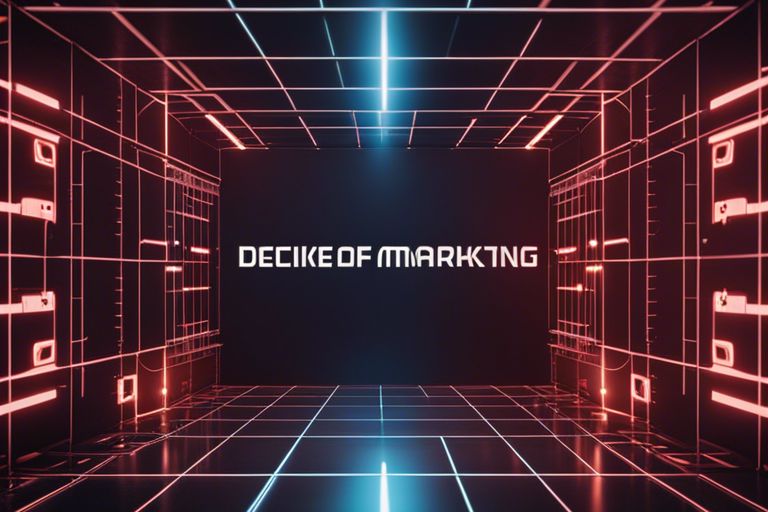Most businesses today are increasingly relying on Artificial Intelligence (AI) in their marketing strategies, and understanding how to harness its power is crucial. This comprehensive guide examines into the world of AI in marketing, providing insights on leveraging AI technologies to optimize marketing strategies effectively. Highlighting the significance of data privacy and ethical considerations, the expert writer offers a clear vision for the future development of AI in marketing, emphasizing the need for responsible implementation to maximize its benefits without negative repercussions. Learn how AI can revolutionize marketing and propel your business forward.
Key Takeaways:
- Definition of Artificial Intelligence: Artificial Intelligence (AI) refers to machines‘ ability to perform tasks that typically require human intelligence, such as learning, adapting to situations, problem-solving, and decision-making.
- Applications of AI in Marketing: AI can be used in marketing to analyze data, predict customer behavior, create personalized content, automate processes, and optimize marketing campaigns.
- Types of AI in Marketing: The main types of AI used in marketing include Machine Learning, Natural Language Processing, and automated Social Media Marketing, each offering unique capabilities to enhance marketing strategies.
- Implementation of AI in Marketing: Successful implementation of AI in marketing involves identifying suitable AI tools, integrating them into existing marketing strategies, and measuring and analyzing AI performance to evaluate campaign success.
- Challenges and Ethical Considerations: Key considerations when using AI in marketing include data privacy and protection, avoiding bias in AI algorithms, and the impact of AI on the workforce, requiring responsible and ethical AI usage in marketing practices.

What is Artificial Intelligence (AI) in Marketing?
Definition of AI
Your understanding of Artificial Intelligence (KI) in marketing is crucial to unlocking its full potential. KI refers to machines‘ ability to perform tasks that typically require human intelligence. This includes learning, adapting to situations, problem-solving, and decision-making. KI technologies rely on algorithms and data to autonomously recognize patterns and make conclusions.
Importance of AI in Marketing
The importance of AI in marketing cannot be overstated. AI can analyze data, predict customer behavior, and optimize automated processes, leading to targeted and efficient marketing campaigns. By utilizing AI technologies, businesses can understand their customers better, create personalized content, and enhance the effectiveness of their marketing strategies significantly.
Types of AI in Marketing
It is important to understand the different types of Artificial Intelligence (AI) used in marketing to leverage their potential. Any strategic implementation of AI can lead to significant advancements in marketing campaigns. Importantly, it is crucial to choose the right AI tools based on specific marketing needs and objectives.
Machine Learning
An integral part of AI in marketing is Machine Learning, which allows businesses to analyze patterns in customer behavior and create personalized marketing campaigns. Utilizing algorithms and data analysis, companies can continuously improve their marketing strategies to cater to evolving customer needs.
Natural Language Processing
To enhance customer interactions, Natural Language Processing (NLP) is used in marketing for chatbots and voice recognition technologies. Understanding customer inquiries in real-time allows businesses to provide tailored support and optimize customer service processes. Additionally, NLP can improve response times and strengthen customer engagement.
| Machine Learning | Analyze customer behavior patterns and create personalized campaigns. |
| Natural Language Processing | Enhance customer interactions through chatbots and voice recognition. |

AI Applications in Marketing
Personalized Customer Experience
One of the fundamental applications of AI in marketing is the creation of personalized customer experiences. By analyzing behavioral data, companies can tailor content and offers for their customers. Machine learning algorithms identify individual preferences and interests, enabling the delivery of personalized messages. This optimization enhances customer experience and strengthens customer loyalty.
Predictive Analytics and Data Processing
Processing vast amounts of data using predictive analytics through AI allows companies to forecast future trends and customer behavior. By analyzing complex algorithms, precise forecasts for the market and target audience can be generated. Automated decision-making based on real-time data helps optimize marketing actions and increase efficiency, maximizing marketing investments while minimizing budget impact.
Content Creation and Management
Analytics-driven content creation and management empower companies to efficiently produce high-quality, relevant content for their audience. AI tools automate the creation of texts, images, and videos, saving resources and ensuring consistent content production. AI algorithms analyze content performance and provide optimization recommendations for better reach and interaction, enhancing targeted communication.
Automated Social Media Marketing
Content applications using AI in social media marketing tools enhance campaign efficiency on social media platforms. By analyzing behavioral data and applying personalized algorithms, companies make automated decisions to deliver relevant content to the right audience at the right time. This approach maximizes social media reach and interactions, elevating brand awareness effectively.
Implementing AI in Marketing
Identifying Suitable AI Tools
One crucial aspect of implementing AI in marketing is identifying suitable AI tools tailored to your specific requirements. The selection process should consider criteria such as user-friendliness, functionality, integration capabilities, and data privacy. Seeking advice from experts can help pinpoint the right AI tools to enhance your marketing strategy.
Integrating AI into Existing Marketing Strategies
Strategies for seamlessly integrating AI into existing marketing strategies entail meticulous planning and execution. It’s vital to incorporate AI tools seamlessly into your current processes and systems to ensure a smooth transition. Employee training is key to effectively leveraging new technologies for enhanced efficiency and improved customer experience. Another vital consideration is to continuously monitor and optimize the performance of AI tools to maximize marketing efforts.

Challenges and Ethical Considerations
Data Protection and Privacy
All companies need to be vigilant about privacy and data protection when implementing AI technologies in marketing. The extensive collection and analysis of data pose risks of compromising sensitive customer information. It is crucial for businesses to adhere to strict data protection policies and handle data transparently to maintain consumer trust.
Avoiding Bias in AI Algorithms
The key ethical concern when using AI in marketing is to prevent bias in algorithms. AI systems are only as unbiased as the data they rely on, raising the risk of reinforcing existing prejudices and discrimination. It is important for companies to proactively take measures to ensure that their AI technologies are fair and just.
Another critical aspect in avoiding bias in AI algorithms is to involve diverse teams in development and review processes to consider different perspectives and experiences. Regular audits and checks must be conducted to ensure that algorithms do not exhibit discriminatory patterns.
Impact on the Job Market
One significant consequence of integrating AI technologies into marketing is its impact on the job market. While some traditional tasks may be automated, new opportunities arise for skilled professionals capable of implementing and optimizing AI-driven systems. Businesses must ensure they train and support their employees to ease the transition to new work processes.
Conclusion
On the whole, „The Definitive Guide to AI in Marketing – Unlocking the Power of Artificial Intelligence“ provides a comprehensive overview of the role of artificial intelligence in revolutionizing marketing strategies. The expert author demonstrates a deep understanding of utilizing AI technologies effectively in marketing and emphasizes the importance of data privacy and ethical considerations. With practical examples and a forward-looking approach, the guide sets a clear path for the future integration of AI in marketing practices.
FAQ
Q: What is Artificial Intelligence (AI) and how is it used in marketing?
A: Artificial Intelligence refers to machines‘ ability to perform tasks that typically require human intelligence, such as learning, adapting to situations, problem-solving, and decision-making. In marketing, AI can be utilized to analyze data, create personalized content, predict customer behavior, and optimize automated processes.
Q: What are the fundamental types of AI in marketing?
A: The fundamental types of AI in marketing include Machine Learning, which identifies patterns and trends in customer behavior for personalized marketing campaigns, and Natural Language Processing, which allows for real-time interaction with customers through chatbots and voice recognition technologies.
Q: How can AI enhance the customer experience in marketing?
A: AI can enhance customer experience in marketing by analyzing behavioral data to create tailored content and offers, predicting future trends and customer behaviors, automating decision-making processes, and optimizing marketing campaigns for better efficiency and effectiveness.
Q: What are the challenges and ethical considerations of using AI in marketing?
A: Challenges and ethical considerations of using AI in marketing include data privacy and security concerns, avoiding bias in AI algorithms, and the impact of AI on the job market. It’s vital to implement AI technologies responsibly, ensuring transparency and adherence to data protection regulations.
Q: What are the future developments of AI in marketing?
A: The future of AI in marketing holds promise for more precise and personalized marketing strategies through the analysis of large data sets. Integrating AI into various marketing tools and platforms will enhance efficiency and effectiveness, while ethical usage and continuous advancements will shape the positive impact of AI in marketing.
